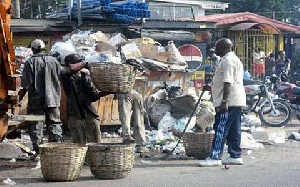By Ebenezer Owusu-Ansah
Ghana’s sanitation crisis has become a defining challenge of our time. From the streets of Accra to the corners of our rural towns, the signs are unmistakable: clogged gutters, foul smelling-public spaces, and a growing sense of resignation to filth are apparent.
But cleanliness is not merely a matter of aesthetics. Cleanliness-often dismissed as a secondary concern-is in fact, a cornerstone of public health, national pride and even economic development.
As an elderly resident of Jamestown, Accra, put it. “We used to sweep our front yards every morning, dispose of the waste in a tidy manner.
Now, people dump garbage on the streets and walk away as if it’s normal.” The article explores why sanitation must be treated as a national emergency-and why each of us has a role to play in restoring Ghana’s health and dignity.
Health first: Dirt is deadly:
The health implications of poor sanitation are dire. Water-borne diseases such as cholera, typhoid, and dysentry continue to plague vulnerable communities, particularly after heavy rains.
Malaria, one of Ghana’s leading causes of out-patient visits to hospitals, is widely transmitted through the anopheles mosquito that often breeds in stagnant water, discarded containers and clogged drains.
The recent phenomenon of the improper disposal of fecal matter has also given cause to the increase of cholera and typhoid.
According to Dr, Mary Afua Konadu, a public health specialist of the Korle Bu Teaching Hospital: “One of the simplest ways to prevent disease is to maintain a clean environment. We keep treating patients for infections that are entirely preventable if basic sanitation is observed.”
Medical practitioners also warn about the long-term exposure of environmental pollution on cardiovascular and respiratory health. In fact, data from the National Cardiothoracic Centre, indicates that more than 60% of adult adult deaths in Ghana are attributed to cardiovascular diseases (CVDs).
The World Health Organisation (WHO) estimates that Ghanaians face a 20% risk of dying from CVDs or other chronic ailments related to lifestyle and environmental exposure.
Urinating in Public: A Health and Dignity Crises:
The normalisation of urination-even by women and children in public, should be considered a public health and societal issue. The pungent smell that permeates bus stops, street corners, and alleys as a result of this undesirable behaviour is not only unpleasant but reflects systemic neglect.
Dr. Linda Nyarko, a urologist, notes: ”Holding urine for long periods can lead to infections and bladder issues. But many people have no safe, clean public place to relieve themselves. It’s a policy failure, not just a personal choice”
Building well-maintained, strategically located public places of convenience should be a national priority. If we are serious about public health, we must provide the infrastructure that supports dignified behaviour.
Environmental Degradation an Institutional Failure:
Beyond our personal behaviour, institutional weaknesses are largely to blame. Factories operate releasing untreated waste into rivers and the environment without ever being checked. Vehicles belch toxic fumes due to weak enforcement by the DVLA. People build and dump their waste anywhere, illegal mining-galamsey, destroy farmlands and poison rivers with mercury and cyanide.
These are not isolated problems-they are connected. Environmental degradation leads to food insecurity, rising healthcare costs, and the loss of tourism and investor confidence.
The cost of the Economy and Tourism:
Ghanaians who travel often marvel at the cleanliness of other countries. The streets are clean. Public spaces are well managed and trash separated and recycled.
A friend of mine traveled to Rwanda, Kigali, last year. He said “I could not believe how clean Kigali is. It made me proud to be an African-but also sad for Ghana. Cleanliness is possible. We’ve just accepted mediocrity here.”
Clean cities attract tourists and investors. Dirty cities repel tourists. In an age where image is currency. Ghana cannot afford to wallow in filth, first impressions matter. Every visitor who leaves our shores with a bad impression of our environment would obviously have a lot of bad memories to tell friends. They may never return or encourage others to visit.
What can be done?
Ghana does not lack the laws or policies; yet environmental and sanitation bylaws are not enforced. Our institutions lack the will to enforce the law while the public have been emboldened to be indisciplined through years of neglect of enforcing the law. Waste management contracts are poorly monitored. Community leaders have been cowed into silence, they are often silent when their
neighbourhoods are turned into dumping grounds.There is yet hope, the situation lies in a coordinated, multi-sectoral approach.
- Policy and Enforcement: Metropolitan, Municipal and District Assembly’s (MMDAs) must enforce sanitation bylaws consistently. Environmental Officers should be empowered to prosecute offenders.
- Infrastructure Investment: Government and private sector players must invest more in clean accessible public places of convenience, waste recycling plants and proper drainage systems.
- Public Health Campaigns: Ongoing education and advocacy, through schools, religious institutions, and the media can reshape behaviour-especially among children and the youth.
- Civil Engagement: Citizens must demand cleaner environments. Community clean-up days, sanitation clubs and reporting litter bags via hotlines or online applications to foster prompt response to areas that need immediate attention would be helpful.
Conclusion: National Pride Begins with Cleanliness:
First impressions last – and Ghana must start paying attention to how it looks, smells and feels. Cleanliness should not be taken for granted. It is a public health issue, a source of national pride and economic imperative.
We can no longer afford to turn a blind eye Qw need a national awakening- a new consciousness that says: “Enough is Enough.” the management of waste is a gold mine, the private sector must be encouraged to invest in waste management.
Our ancestors fought for our independence. We must now fight for our health and dignity. Let this be the generation that would reclaim Ghana’s beauty and safegaurd its future.










